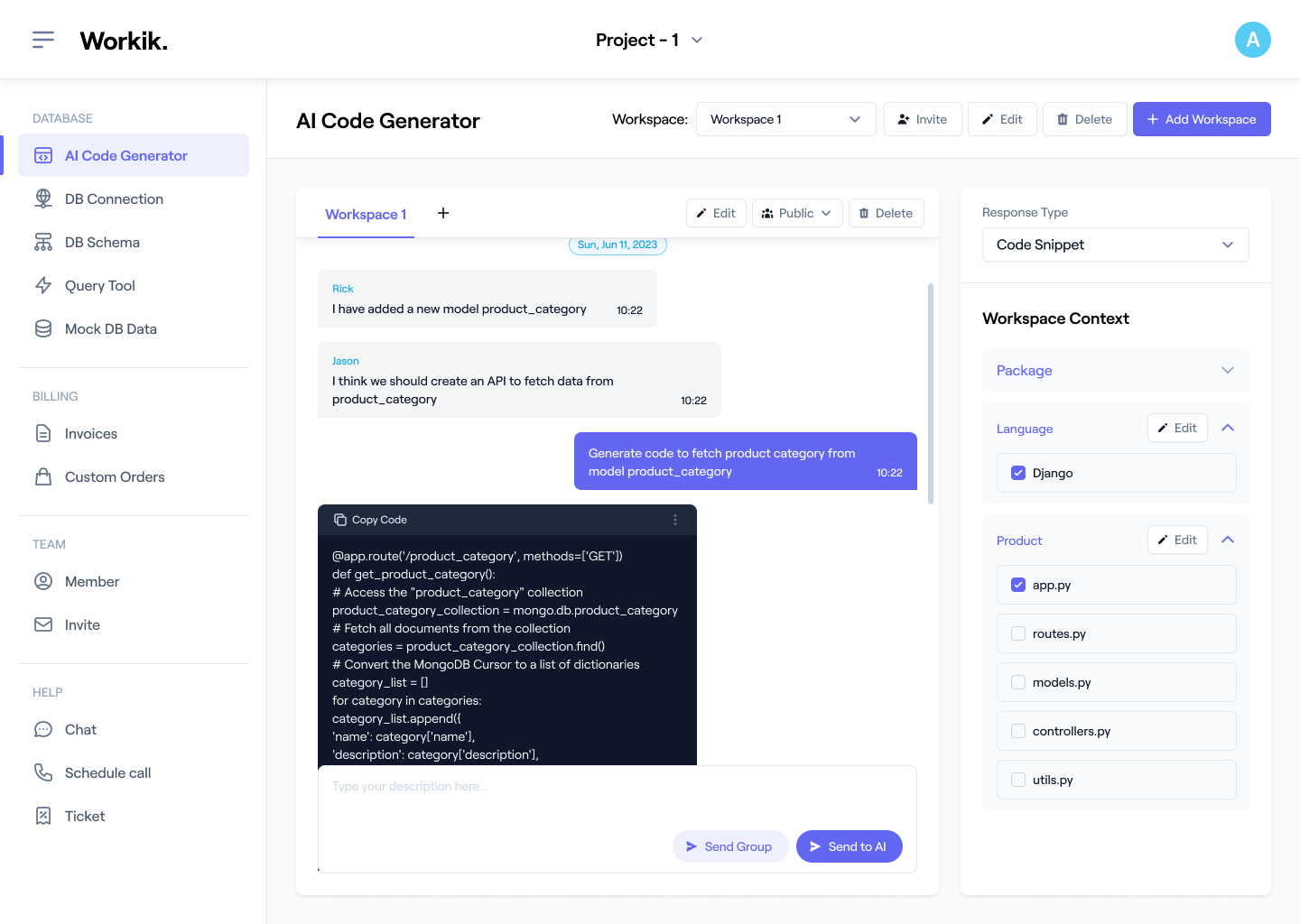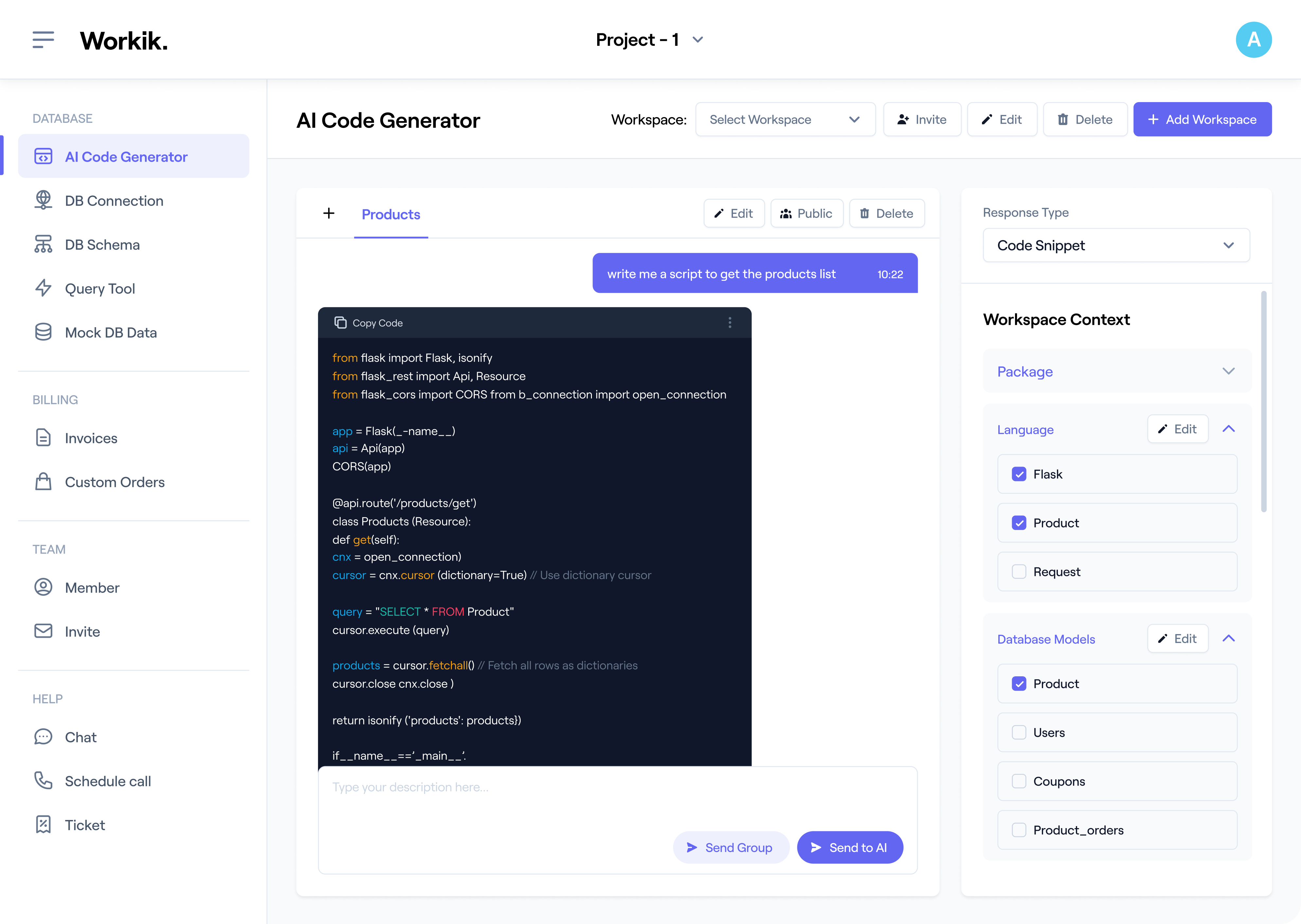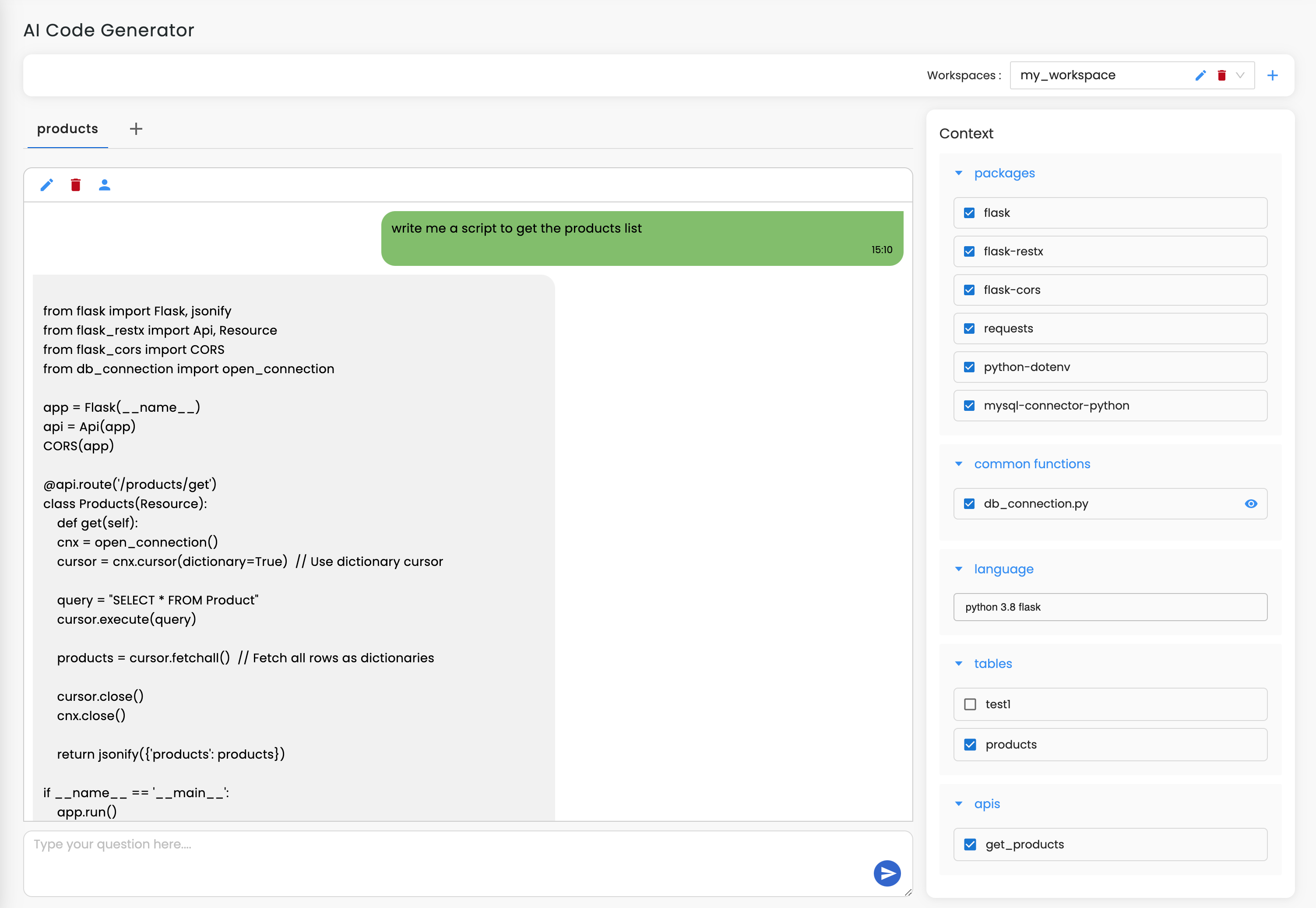
Join our community to see how developers are using Workik AI everyday.
Features

Automate Complex Workflows
AI automates multi-step flows like logins in Cypress, creating reusable commands to reduce redundant code in complex tasks.

Accelerate CI/CD Integration
Integrate AI-generated Cypress tests into CI/CD, using parallelization on GitHub Actions or Jenkins to boost test speed and reliability.

Boost Data-Driven Testing
AI uses dynamic fixtures to introduce varied data into tests, enabling real-world scenarios and early detection of edge cases.

Validate API-UI Interactions
AI stubs API responses to sync with UI actions, using real-time logs and snapshots to ensure accuracy with backend updates.
How it works
Sign up with Google or enter your details to access Workik’s AI-powered Cypress tools.
Connect your GitHub, GitLab, or Bitbucket repositories. Define testing frameworks like React, Angular, or more and add API schemas for tailored AI assistance with Cypress.
Provide project details, and let AI generate Cypress test cases for components, interactions, and form validations. AI also optimizes test structures, generates assertions, and offers debugging insights.
Invite your team to collaboratively review as you run test cases. AI helps troubleshoot failures, refine accuracy, and ensure comprehensive test coverage.


Expand
.png)
.png)
Expand


Expand


Expand


Expand


Expand


Expand


TESTIMONIALS
Real Stories, Real Results with Workik
AI-generated Cypress tests made multi-step workflows effortless, saving us hours in setup.

Leah William
QA Engineer
Integrating Cypress with CI/CD was seamless. AI optimizations kept build times efficient and reliable.

Alfie Tunes
DevOps Specialist
Dynamic data-driven tests helped us catch edge cases early. Essential for maintaining test coverage.

Ethen Mayers
Front-End Developer
What are some popular use cases of Workik’s AI-powered Cypress Test Case Generator?


Some popular use cases of Workik’s AI-powered Cypress Test Case Generator include but are not limited to:
* Automating multi-step workflows, such as login and checkout processes.
* Generating dynamic, data-driven tests to simulate real-world user scenarios.
* Validating API responses to ensure UI and backend interactions are synchronized.
* Setting up end-to-end tests across frameworks like React, Angular, and Vue.
* Ensures reliable behavior across different browsers with generated test cases.
* Validates accessibility elements like ARIA roles to meet usability standards.
* Detects unintended visual changes by capturing and comparing UI snapshots.
* Simulates errors, such as network failures, to test application recovery paths.
What context-setting options are available in Workik’s AI for Cypress Test Case Generator?


Workik offers several context-setting options for Cypress Test Case Generator, allowing users to:
* Link repositories from GitHub, GitLab, or Bitbucket for direct integration.
* Specify frameworks like React, Angular, or Vue for targeted test generation.
* Add API schemas to customize API testing and validation.
* Import mock data files to enable data-driven and edge case testing.
* Define authentication flows (e.g., OAuth, multi-factor) for secure login testing.
* Set up database connections to validate backend interactions.
* Specify user role definitions to test permission-based scenarios.
* Configure environment variables for testing across different app states.
What value does AI bring to visual regression testing?


AI captures snapshots of the UI and automatically detects any visual changes, ensuring that the interface remains consistent as updates are made. This is especially valuable for visually complex applications where UI stability is essential.
Can AI handle conditional test scenarios?


Yes, AI generates tests for conditions like low network speeds or failed UI loads, ensuring comprehensive validation of user journeys, even in edge cases.
Is there support for multiple-device viewports?


Yes, AI generates tests across various screen sizes to confirm that both layout and functionality are consistent, providing an optimized user experience on desktops, tablets, and mobile devices.
Generate Code For Free

Cypress: Question and Answer
Cypress is a JavaScript-based end-to-end testing framework for web applications. It enables real-time testing in the browser, handling complex user interactions, API testing, and UI validations to ensure application reliability.
Popular tools and libraries that work with Cypress include:
Languages:
JavaScript, TypeScript
Frameworks:
React, Angular, Vue, Next.js
CI/CD Tools:
Jenkins, GitHub Actions, CircleCI, GitLab CI
Test Reporting:
Mocha, Chai, Cypress Dashboard
Automation Tools:
BrowserStack, Sauce Labs
Popular use cases for the Cypress Test Case Generator include but are not limited to:
Automating Workflows:
Generating tests for multi-step flows like login and checkout.
Validating APIs:
Creating test cases to verify API calls, ensuring UI and backend sync.
Simulating Data-Driven Scenarios:
Running tests with varied data to validate real-world conditions.
Ensuring Cross-Browser Compatibility:
Automating tests across browsers for consistent behavior.
Testing Accessibility:
Checking ARIA roles, keyboard access, and screen reader support.
Cypress expertise opens up roles such as Test Automation Engineer, QA Engineer, DevOps Engineer, Software Development Engineer in Test (SDET), Full-Stack Developer, Quality Assurance Analyst, CI/CD Engineer, and Site Reliability Engineer (SRE).
Workik AI enhances Cypress test generation by:
Automated Test Creation:
Instantly generates Cypress tests for workflows, validations, and reusable patterns.
Debugging:
Flags failures with fix suggestions, code insights, and logs.
API Testing:
Simulates varied API responses, covering timeouts and errors.
Environment Adaptation:
Adjusts tests for staging, production, and local setups.
Performance & Refactoring:
Optimizes commands, removes redundancies, and restructures tests for speed.
Data Management:
Automates dynamic and mock data for data-driven tests.
Visual Checks:
Captures snapshots to detect UI changes across updates.
Conditional Paths:
Adapts tests for different network speeds and user roles.
Explore more on Workik
Get in touch
Don't miss any updates of our product.
© Workik Inc. 2026 All rights reserved.

